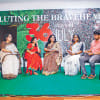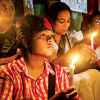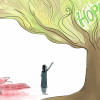"This is your country too! You must keep it clean," a 19-year-old thoughtful young woman was seen advising street vendors.
"I just completed my A-levels. My friends and I have been trying to clean the area near our school. We have achieved our victory after so much struggle and cannot lose it now. We want to see a beautiful Bangladesh," explains Arifa, a student at Manarat Dhaka International School and College.
Like Arifa, numerous students across Bangladesh have stepped forward to ensure traffic management, cleanliness, and order during a critical time of political transition.
In the wake of the political upheaval following the resignation of former Prime Minister Sheikh Hasina on 5 August 2024, the country found itself in a precarious situation. Students have emerged as key figures in maintaining stability and order during this period.
One such example is Safwan-Al-Abedin, a student at the Bangladesh University of Professionals (BUP), who detailed a proactive day: "On 5 August, we went to Jatiya Sangsad Bhaban and found some students guarding the gate, as the parliament building had previously been vandalised. We went inside and started to clean the rubbish and rub off the paintings left by the mob."
After cleaning up the national assembly building, they continued their efforts at the Shaheed Minar and subsequently, in the Mirpur cantonment area where Safwan resides.
The movement is not isolated to individual acts. At Dhaka University, students have formed organised teams, systematically cleaning their campus and surroundings. This approach has not only helped maintain cleanliness, but has also fostered a sense of unity and shared responsibility among the student body.
Despite their positive contributions, these students sometimes face challenges. "There have been instances where some of the students were harassed by people belonging to a certain political party. These individuals came, took pictures, and left without contributing to our efforts," Safwan lamented, expressing hope for broader understanding and support for their cause.
Echoing this sentiment from across the seas was Jayita Ujjaini, a student at the University of Arkansas, who returned to Bangladesh temporarily to renew her visa and found herself swept up in the wave of student activism. "Cleaning Jatiya Sangsad Bhaban was incredibly fulfilling," she shared, urging the community at large to step in. "Once educational institutions reopen, students won't be able to contribute as much. The general public must continue this work to maintain order."
Armed with whistles and traffic batons, students have guided pedestrians and vehicles, encouraging people to use sidewalks when possible. Despite dense traffic, their coordinated method effectively avoided congestion.
In addition to the student volunteers, members of the Ansar were present to help manage traffic. Importantly, female students were actively involved in these traffic management duties, showcasing a robust commitment to civic responsibility.
The efforts of these young individuals during a turbulent political time highlight an essential truth about leadership and responsibility. They are not waiting to inherit the future – they are shaping it now with brooms and traffic cones in hand. Their work is a powerful reminder of the impact of collective action and the importance of community in times of crisis.
Therefore, as Bangladesh moves forward, the resolve and actions of its youth serve as a beacon of hope and a blueprint for how every citizen can contribute to the nation's welfare and beauty.









Comments